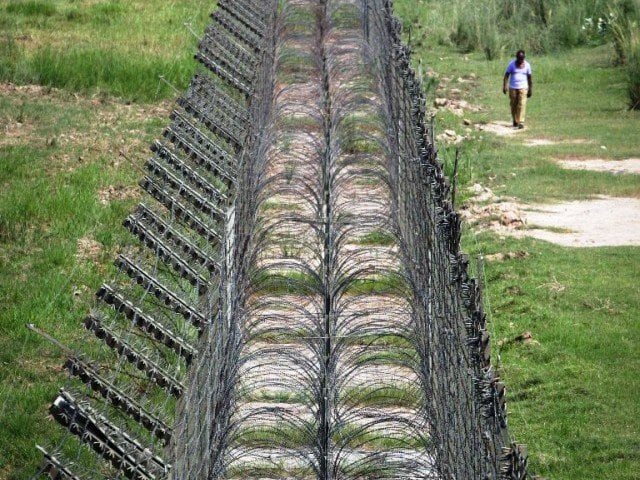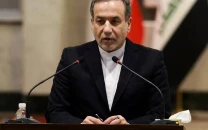Changing IOK status will violate international law: experts
Indian media suggest New Delhi might trifurcate disputed region

Indian media suggest New Delhi might trifurcate disputed region. PHOTO: REUTERS/FILE
Although Indian experts have claimed that there are provisions in the Indian constitution to change the boundaries of any state sharing a border with Pakistan, legal experts on this side of the Line of Control (LoC) have raised doubts that such a move would be illegal under the international law, while some questioning its legality even under the Indian law.
According to Indian reports, any attempt to change the boundaries or create new states would first face a significant legal challenge in the form of Article 370 of the constitution of India.
Anxious tourists flee occupied Kashmir after 'terror' warning
Unlike Article 35-A – which was added to the constitution through a presidential decree and grants the state legislature permission to define "permanent residents" of the state and provide special rights and privileges to permanent residents – Article 370 is considered "a formal part of the constitution", and gives autonomous status to occupied Kashmir.
Although both laws were initially conceived as temporary, experts said, the 'formality' is based on the Constituent Assembly of Jammu and Kashmir having written the state's constitution and dissolving itself without actually recommending the abrogation of Article 370.
Indian reports suggest Article 370 can be amended through Article 368(1). This would require introducing a motion in the Lok Sabha seeking an amendment to the constitution to abrogate Article 370 through Article 368(1), which gives parliament the authority to and lays out the procedure to amend the constitution.
Both houses of Indian parliament – Lok Sabha [lower] and Rajiya Sabha [upper] – would have to pass the amendment, and then half the state would have to ratify it, which would take a long time. Following the abrogation of Article 370, the Indian parliament would have the authority to redraw the boundaries of the state.
The parliament would then use its powers under Article 3 to create new states or redraw existing boundaries, both of which are illegal as long as Article 370 stands.
India's IANS news agency quoted former Lok Sabha secretary general Subhash Kashyap as having said that Article 370 is a temporary provision and not a special provision. Kashyap had explained that out of the various temporary, transitional, and special provisions, temporary ones are the weakest. He said it is only a matter of determining how and when it will be ended.
Pakistani legal experts disagreed.
"Any attempt by India to change the existing constitutional arrangement of Indian occupied Kashmir will be a violation of international law and UN-mandated obligations," said international law expert Ahmer Bilal Soofi.
He argued that any changes on the ground shall violate the Fourth Geneva Convention, while calling on the government of Pakistan to take up this issue very strongly before the international community, including the UN.
"If Indian held Kashmir is divided into states, India will be in a clear violation of the UN Resolutions. Legally, a disputed territory cannot be divided into sub territories. As per law, it won't change the legal status of the disputed land," said Pakistan's former ambassador to France Ghalib Iqbal.
He also said it's obvious that India is trying to do everything possible to retain an illegitimate control over Kashmir and India should be worried about how long before it is not able to.
Barrister Taimur Malik, another international law expert, explained that Article 35-A and Article 370 provide key safeguards to the people of Kashmir and help maintain the status quo of the territory as a disputed area.
He said abolishing them "would be in violation of India's international commitments, as well as impacting the treatment of AJK by Pakistan, which has a similar status at the moment."
He said Pakistan should immediately approach the United Nations and other international forums to exert international pressure on India to prevent this from happening. "Perhaps a resolution of the UN Security Council should be sought to place India under international legal obligations," he opined.
Given the nature of issue, he said Pakistan could also "interpret this as an act of aggression against Pakistan and hence possibly an act of war as occupied Kashmir's disputed territory status is fundamental to Pakistan's foreign and security policy and any attempt to amalgamate this territory into Indian territory shall amount to annexation of territory claimed by Pakistan."
"Article 35-A of the Indian constitution protects occupied Kashmir's permanent residents, whereas Article 370 supposedly affords the state autonomy. Should Modi even touch either amendment or attempt to split Jammu and Kashmir, it will amount to ripping up the multiple UN resolutions that guarantee [the right of] safe return," said Barrister Asad Rahim Khan.
He noted that the move would also be disastrous for any prospect of peace, as for nearly half-a-century, New Delhi's policy has been to preclude third-party mediation by pegging the Kashmir dispute to the Simla Agreement of 1972, which explicitly states that "neither side shall unilaterally alter the situation" with regard to the problems between the two countries.
He added that by "parachuting Hindu settlers into the Valley and continuing to brutalise its Muslim residents, Modi's Hindutva project will end up not only destroying the Valley but also upending the legal consensus of the last many decades.


















COMMENTS
Comments are moderated and generally will be posted if they are on-topic and not abusive.
For more information, please see our Comments FAQ